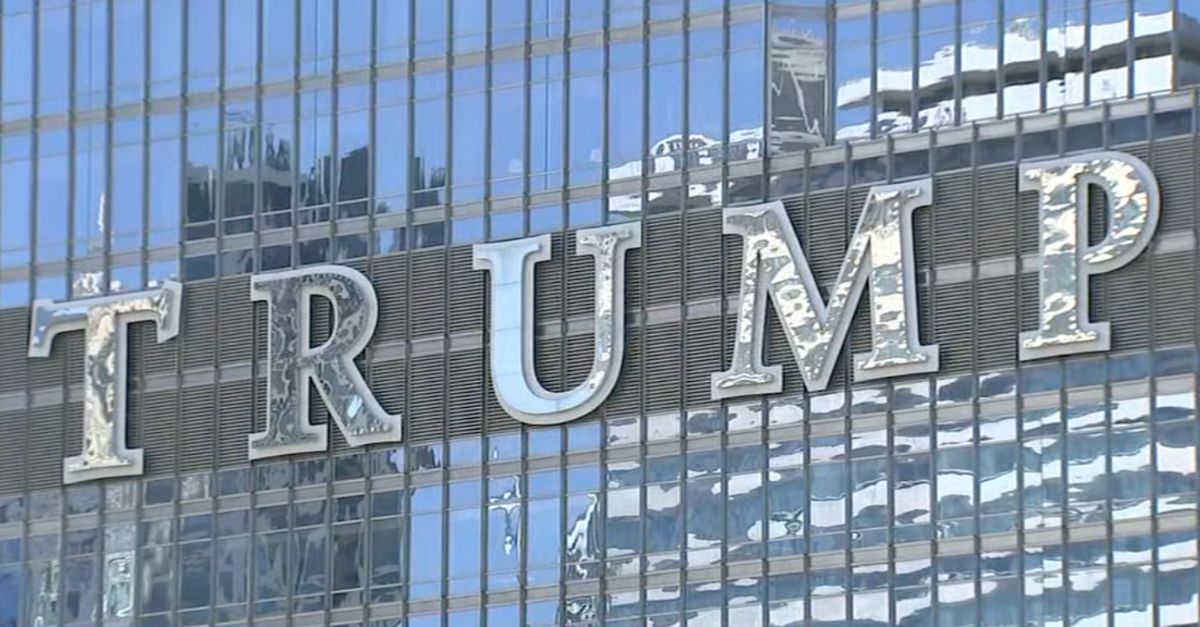
Trump International Hotel & Tower Chicago (WLS/YouTube).
A defamation lawsuit filed against the Chicago Sun-Times over its 2020 reporting about a Republican state agency head who allegedly “pushed” for politically-motivated property tax breaks on Trump International Hotel & Tower, according to the paper, was greenlit by the Illinois Supreme Court this week.
The suit, filed by former Illinois Property Tax Appeal Board Executive Director Mauro Glorioso in 2021, alleges the Sun-Times “falsely reported” Glorioso’s involvement in President-elect Donald Trump’s successful appeal bid to slash his Trump Tower property taxes from 2011 by $1 million. The paper reported that an anonymous complaint was made against Glorioso with “allegations of political motivations improperly driving [Glorioso’s] decision-making,” according to state officials.
The complaint said Glorioso — a Republican attorney from Westchester, Illinois, who was appointed to the tax appeal board in 2019 — “pressured his staff to rule in the president’s favor, rejecting the staff’s decision to deny Trump any [tax] refund,” per the Sun-Times’ reporting, which is cited and quoted in Glorioso’s defamation suit. The accusations also included claims of repeated attempts by Glorioso to put Trump’s tax appeal push on the board’s agenda, according to the Sun-Times.
“Defendants’ front-page publications that ‘Glorioso ordered the agency to approve the $1 million payout for Trump, rejecting a staff report that found no valid reason to support the refund on the tax bill for [Trump Tower],’ are material fabrications and the antithesis of fair reports and substantial truth,” Glorioso’s suit says, pointing to past rulings by the lower courts and Illinois Office of Executive Inspector General in his favor.
“Defendants disregard that their articles did not seek favorable government relief,” the suit alleges. “They aggressively defamed Glorioso through fabrications masquerading as ‘news,’ falsely embellished an unfounded anonymous OEIG complaint, and then told readers that Glorioso, in fact, engaged in the alleged acts, including unethical conduct not even alleged in that complaint.”
OEIG investigators probed the claims about Glorioso and deemed them “unfounded,” the Sun-Times reported, but they also determined that Glorioso had broken state law and policy when he deleted files and emails pertaining to Trump’s tax appeal, which ultimately led to his firing in Oct. 2020.
Trump later won his property tax bid in April 2023, with an appeals court ruling that Trump Tower was overvalued in 2011 by Cook County officials. The Sun-Times reported that Chicago Public Schools would lose $540,000 in funding because of the appeal win.
On Thursday, Illinois’ highest court voted unanimously to let Glorioso’s legal crusade continue after the Sun-Times failed to prove that Glorioso’s suit was a “meritless” and “retaliatory” Strategic Lawsuit Against Public Participation attempt, or SLAPP. The newspaper filed for dismissal in September, citing the state’s Citizen Participation Act, which is aimed at eliminating lawsuits where plaintiffs are “intimidating, harassing, or punishing citizens” for engagement in “public affairs.”
“This issue concerns whether plaintiff’s goal in filing the lawsuit was to seek damages for the harm caused to his reputation and character or whether the sole intent was to chill defendants’ rights of petition and speech related to participation in government,” Justice David Overstreet wrote in the court’s ruling, which sided with the lower court’s decision to approve Glorioso’s lawsuit.
“The court noted precedent that identified two factors considered on this issue: the timing of the lawsuit and the relationship between damages requested and the injury,” Overstreet said. “In evaluating these factors, the appellate court concluded that defendants failed to show plaintiff’s lawsuit is retaliatory. Because it found in favor of plaintiff on both elements constituting defendants’ initial burden to show the lawsuit is a SLAPP, the appellate court affirmed the circuit court’s judgment.”
The Sun-Times dismissal attempt came after a Georgia appellate court allowed Glorioso’s lawsuit to continue in May 2023. According to his suit, the court found that “in looking at the OEIG Complaint, it is clear that the Defendants’ reporting on the related investigation is not consistent with the ‘gist’ or ‘sting’ of the allegations therein.”
The Sun-Times was also found to have conveyed an “erroneous impression to the ordinary reader regarding the allegations against Glorioso and investigation into the OEIG Complaint,” according to Glorioso’s suit.
“This is not to minimize or understate the importance of the press and other news media in our democracy,” Overstreet explained about the Illinois Supreme Court’s decision. “Our jurisprudence is replete with privileges and other protections designed to protect these concerns, many of which remain at issue in this lawsuit. We are simply holding that the [Citizen Participation Act] ‘specifically protects government participation and does not encompass all media reports on matters of public concern as advocated by defendants.”
In response to the decision, Sun-Times lawyer Damon Dunn released a statement on Thursday saying the paper was disappointed by the state’s Supreme Court vote.
“[A]t a time when the First Amendment is under siege, it is disappointing that the court declined to revisit its prior opinion and protect speech on matters of public concern under our Illinois statute, particularly when other states recently took steps to ensure their SLAPP laws protect news reports on the conduct of government officials,” Dunn said. “The newspaper looks forward to proving this case is meritless under the constitutional protections for the press that the Court recognizes are still at issue and getting to the bottom of why the Trump Tower tax appeal was handled the way it was.”
Back when Glorioso first filed his suit, the Sun-Times interim editor-in-chief at the time, Steve Warmbir, said the paper “stands by the accuracy of the stories” about him.
Glorioso’s lawyer, Phillip Zisook, told Law&Crime on Friday that he wasn’t surprised by the latest legal development, saying: “The Illinois Supreme Court thoroughly analyzed, not only the Illinois Citizen Participation Act but the defendant’s motions to dismiss under the act — as well as the facts of the case — and correctly determined that the Sun-Times in its articles did not seek favorable government relief or take any action with respect to the anonymous complaint they purported to be reporting on.”
According to Zisook, the Sun-Times articles “fell outside of the scope” of the Citizen Participation Act because they were not “genuinely aimed at procuring government relief,” which is required. “Although the Sun-Times argues that its articles were matters of public concern, the Illinois Citizen Participation Act only protects speech or conduct that is … genuinely aimed at procuring government relief,” Zisook says. “They were outside the scope of the act.”
Glorioso’s suit now awaits a mandate from the Illinois Supreme Court to officially return the case to the circuit court, where it is expected to be sent by December 2026, per Zisook.
“Then it’s up to the circuit court to schedule a date,” he said.
Have a tip we should know? [email protected]



